Market Hopping Around Lagos
Article and photos by Lola Akinmade
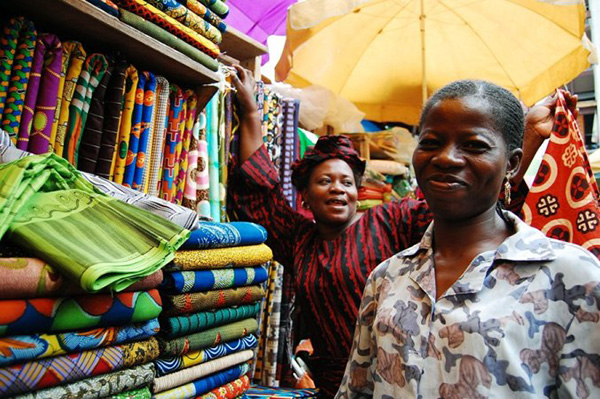 |
| Balogun Market ankara vendors. |
There were only four items on my to-do list — buy some Ankara, buy some groceries, find a tailor, and get some original artwork. “You can’t find them all at the same place,” Remi explains as we travel along Lagos Mainland Bridge towards our first stop, Balogun Market. It was a hot Friday morning in August, and traffic was already getting backed up for miles. Someone raps on the car window on my side and presses a bag of fried plantain chips against the glass. He is a street vendor. I shake my head. Street vendors are a common sight on the bustling streets of the metropolis of Lagos, Nigeria. They sell snacks and water in traffic as if trying to prepare and hydrate you in anticipation of an all-day shopping obstacle course.
We descend the bridge and go under it to find Balogun Market. Situated across from the Lagos Marina, the famous Balogun Market sells daily necessities and provisions such as shoes, clothing, and school supplies. It is also known for various quality fabrics such as African lace and, of course, Ankara.
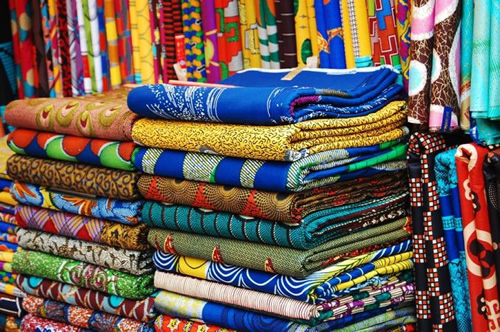 |
| Balogun Market ankara fabric. |
Jeans are to casual American wear what an Ankara is to casual Nigerian wear. Made in Holland and Ghana, Ankaras come in various qualities, colors, and designs. Once acquired, They are handed to local tailors to sew into outfits. Balogun market is divided into nameless regions and alleys based on what its vendors collectively sell.
We were looking for "Ankara Alley."
After a 10-minute dodge course — narrowly missing vendors, porters, and motorcycles squeezing through crowds and leaping over backed-up drainage — we make it to the narrow alley, and a wave of color hits us. Walls of Ankara surround us, and we spin around awed. Picking through thousands of folded multicolored cloth was impossible, so strategy was plotted — color first, pattern second, price third.
I find a gorgeous black Ankara with white and orange flower prints. "Sister, sister!" the Ankara vendors call out. They are women about my age. If I'd been older, they'd have called me "Mommy! Mommy!" "See this one! See this one!" they lift folded cloth up to my nose like I was meant to sniff them like flowers. We haggle a little bit about the price, and they graciously knock a couple of Naira off the price. One must be generous when trying to purchase beautifully printed material so unique that only a handful of people on Earth own that design.
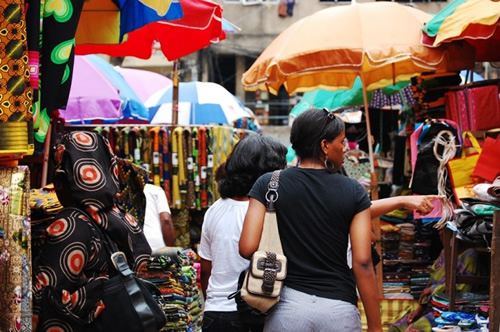 |
| Balogun Market ankara alley. |
It was noon, and I was already drenched in sweat when I checked item one off the list: buy some Ankara.
We continued our quest for groceries. Remi directed the driver towards Oke Arin Market, which translates to “Up the Middle” market. Oke Arin is where Lagos residents buy groceries that last an entire month. These food items are usually sold in bulk, from sacks of rice and tubers of yams to baskets of tomatoes and onions. When parking was secured, and I tried to open the door, a butcher was at the car window, balancing raw meat on a cardboard box. I leaned back, not sure of what to make of this sight. “It is very fresh. Madam”, he tries to pitch the quality of the meat to me. “We will find fresher meat in the market,” Remi assures as we head in.
Oke Arin is like a roadside farmers market, magnified a thousand times. The freshest vegetables, fruits, livestock, and starches are here. In addition to organic items, provisions like canned milk, sugar, and cereal could also be purchased here in bulk. I strike up some conversation with a tomato vendor. I was instantly drawn to his strong jawline and sharp facial features. He was wearing a Gambari hat, synonymous with Hausas from the Northern part of the country. The Hausa people are the largest ethnic group in Nigeria. They are revered merchants and savvy traders known for raising cattle and growing crops. After two hours at Oke Arin, we return to the car with rice, tomatoes, onions, vegetables, and fresh meat.
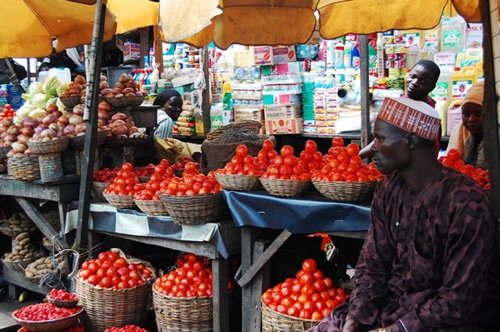 |
| Oke Arin Market tomato vendor. |
With two items down and two more to go on the list, fatigue set in, and my endurance to continue the shopping mission wore thin. We’d already trekked miles through mazes of vendors at both Balogun and Oke Arin markets. “We will find your tailor at Iponri Market and some artwork at Jakande Market,” Remi gives me a status update. “We’re almost done”.
Iponri Market is structured differently than the previous two markets. Balogun and Oke Arin markets have open-air sections. However, Iponri is a series of bungalows with about 400 sq. ft. rooms for each shop. At Iponri, I spotted yellow rickshaws. They were used to transport yards of fabrics from textile markets to the tailors here at Iponri. I knew we would find a tailor here to sew my Ankara cloth, but I hadn’t anticipated rows and rows of tailors. There were tailors for each specific type of fabric. Some tailors only sewed for men, tailors who only made embroidery patches for clothes, tailors who only sewed lace, tailors who only sewed Ankara… You get the picture. Sprinkled intermittently between the tailors were shops that sold food items, snacks, and a few groceries. They catered to customers who came to drop off fabric but didn’t have time to make it to bigger grocery markets like Oke Arin. Was the concept of one-stop shopping, prevalent in the Western world, finally catching on? I pondered.
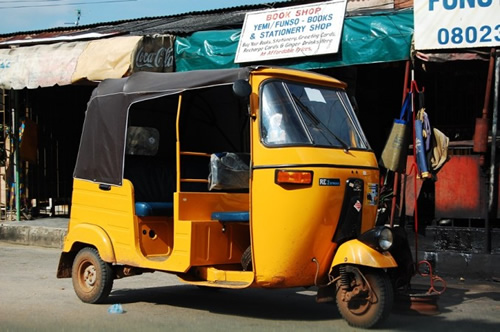 |
| Iponri Market rickshaw. |
We arrive at Remi’s favorite tailor. The tailor has a modest shop with four apprentices tapping away at old-fashioned sewing machines. I flip through magazines of different African outfits. The perfect style had to be picked for the Ankara, which I’d bought earlier at Balogun Market. We return to the car after taking my measurements and dropping off the fabric with the tailor. “Ha! The guinea fowl!” Remi exclaims, and we take a little detour within the market to find a vendor selling live guinea fowl. Guinea fowls (or guinea hens) are a family of birds similar to pheasants and partridges. They are very popular in Africa and are an alternate source of poultry meat. We find the vendor, buy two guinea fowls, and add them to our groceries sitting in the trunk of the Oke Arin market.
It was just after 4 p.m. We still had one last stop, Jakande Market, known for original artworks, world-class crafts, ceramics, beads, and sculptures. We hurtled down the highway to get there before hitting the 5 p.m. rush hour traffic. Jakande is located on the Lekki Peninsular, a barrier island separated from Lagos Island by a lagoon called Five Cowrie Creek and the Atlantic Ocean on its other side. Trudging through muddy island streets, we get to Jakande — a collection of covered artisan shops structurally similar to Iponri.
Once inside, I am immediately overwhelmed by traditional artwork. There are wooden carvings, metal and ivory sculptures, and colorful paintings of people, traditional events, and scenery indigenous to various parts of Nigeria. Adding to Jakande’s mystic is the fact that the artisans themselves sell their own artwork. So, we got to meet the artists and get firsthand interpretations of their creations. Just as we were hit with towers of colorful Ankara in Balogun Market, we didn’t know how to start shopping for artwork and beads at Jakande. There were thousands of strings of multicolored wooden and coral beads and handmade jewelry. I instantly morphed into a bride-to-be, speechlessly gawking at a diamond ring.
This time, the strategy was to buy the first item that caught our fancy and not regret it once we found something prettier or more colorful at the next store. After a grueling hour filled with indecision, we finally left Jakande with paintings denoting various musicians — drummers, guitarists, flutists — and some wooden beads.
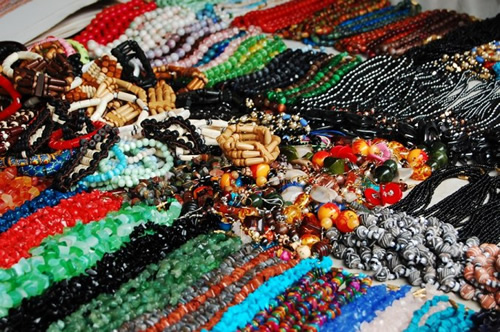 |
| Jakande Market beads |
We merged into traffic again but hit the dreaded rush hour commute this time. I sat exhausted on the way back home. We’d successfully visited four markets and miraculously accomplished all our shopping goals.
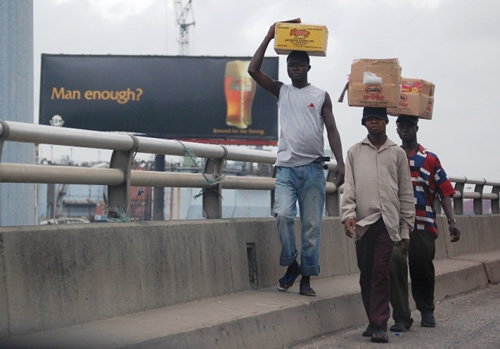 |
| Men in Lagos returning from market. |
As we sit in traffic, a shadow looms by my window, and I look up. It is a street vendor with a bag of fried plantain chips pressed against the glass again. This time, I wind down the window and purchase two bags from him.
The day had come full circle.
Navigating four large markets in one day is an ambitious goal for a foreigner.
For many Nigerians, it’s just a regular Friday.
Lola Akinmade's photography and travel writing have appeared in National Geographic, BBC, CNN, The Guardian, Travel + Leisure, Slate, Travel Channel, Lonely Planet, Forbes, Fodor’s, AFAR, National Geographic Channel, Adventure Magazine, several in-flight magazines, New York Times. Her work can be seen at www.lolaakinmade.com.
|
